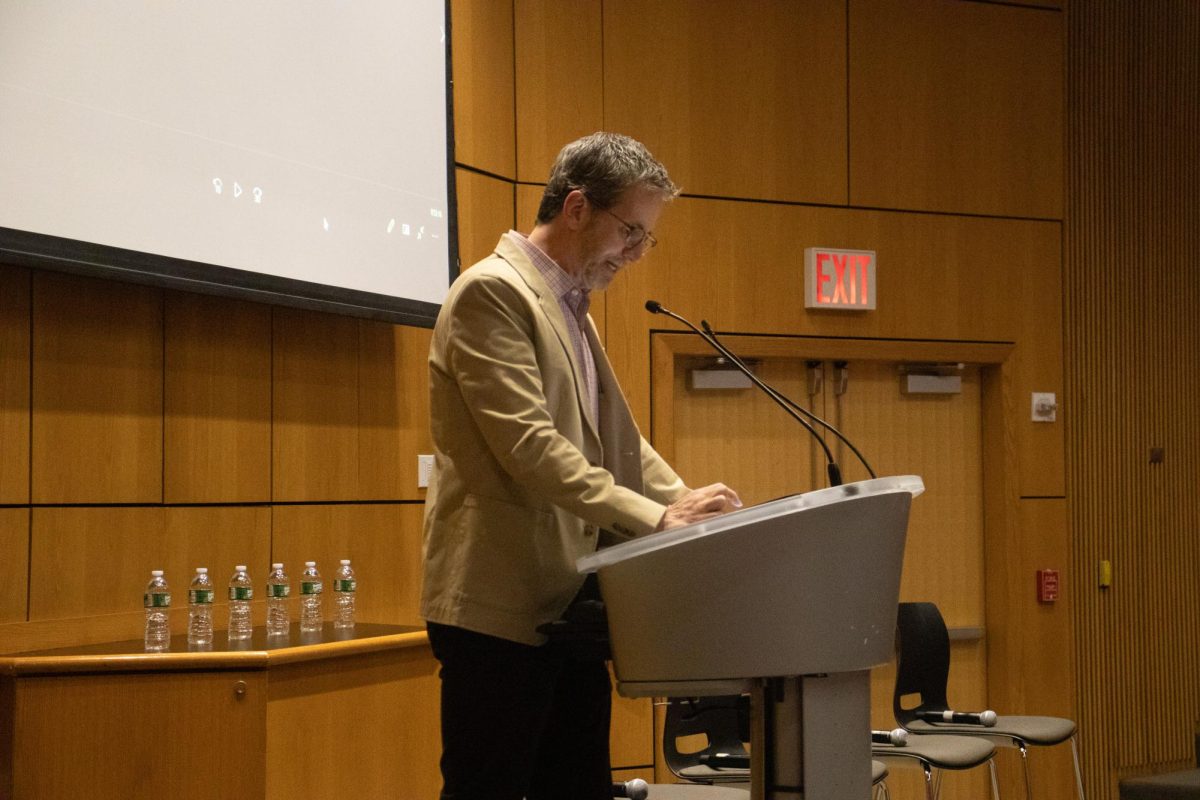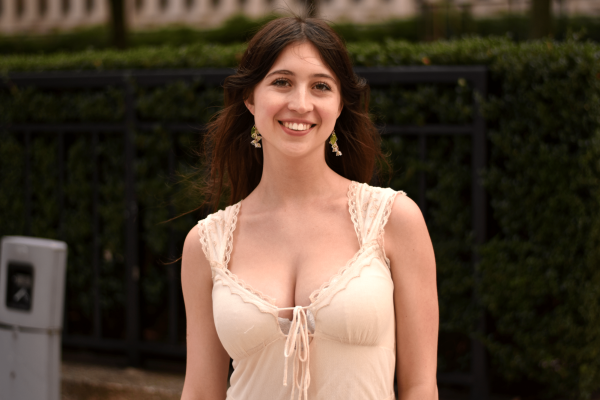Fordham hosted a film screening and discussion honoring the centenary of the life and legacy of John McNeill, a pioneer in Catholic LGBTQ+ ministry. Panelists connected McNeill’s work to modern national, theological and political issues on Oct. 6 in the McNally Amphitheatre at Fordham Lincoln Center.
The event opened with a screening of the hour-long documentary “Taking a Chance on God” detailing McNeill’s life by filmmaker, theologian and activist Brendan Fay. Fay was also a panelist.
The film was followed by a panel discussion during which audience members could submit questions. There were around 50 attendees and the audience was primarily of an older demographic, with relatively few undergraduate students in attendance.
“It is easy to pay lip service to the notion of human dignity. It is quite another to live it out and extend that dignity to everyone around us. It is our hope that by engaging John McNeill’s incredible legacy tonight, we might together rise to that challenge.” Michael Lee, Director of the Curran Center for American Catholic Studies and Professor of Theology
Michael Lee, director of the Curran Center for American Catholic Studies and professor of theology, opened the event with a brief statement on its purpose.
“It is easy to pay lip service to the notion of human dignity. It is quite another to live it out and extend that dignity to everyone around us. It is our hope that by engaging John McNeill’s incredible legacy tonight, we might together rise to that challenge,” Lee said.
Dignity was a central principle of McNeill’s work, the documentary and the panel discussion that followed.
John McNeill (1925-2015) was a theologian, advocate, scholar and gay man who was expelled from his position as a Jesuit priest for his activism for LGBTQ+ people in the Catholic Church. He was an early trailblazer in queer theology.
McNeill enlisted in World War II at 17 years old and was taken prisoner and brought to a Polish labor camp, facing near-starvation. His experience there inspired him to enter the Jesuit order. He was ordained in 1959 here at Fordham.
McNeill was heavily involved with protests against the Vietnam War. He believed that, as a Christian, he had a responsibility to be a conscientious objector.
“When I think about the work that the rest of us have done, we wouldn’t have done it if John had not done the work that he did. It would never have occurred to us. And to see the price he paid, I mean, it’s unspeakable.” Mary Hunt, Leading Feminist Theologian and Co-Founder of Women’s Alliance for Theology, Ethics and Ritual
In the 1960s, amid psychologists, politicians and the police force arresting and labeling gay people as mentally ill, McNeill published three articles in the Homiletic and Pastoral Review, a Catholic magazine. These were the first theological texts to reject traditional Christian doctrine on homosexuality and argue that same-sex relationships are “holy and life-affirming.”
The articles were later published in a book, “The Church and the Homosexual,” approved by Pedro Arrupe, the then general of the Society of Jesus in Rome. McNeill had to repeatedly request said approval after Arrupe’s secretary hid his initial letters, and it was later revoked.
The book was a sensation, sparking outrage, hate mail and death threats, but above all, a huge movement of queer theology. McNeill toured the country appearing on talk shows and spoke about his experiences as a gay man and Catholic priest. Robert Carter, a fellow gay Jesuit priest, called the book the “single most important event of the 20th century for gay liberation.”
Bryan Massingale, the James and Nancy Buckman Chair in Applied Christian Ethics and panelist, described his experience discovering the book as a 22-year-old, closeted seminarian as “earth-shaping.” He checked the book out from the seminary library without using his name for fear of drawing attention to himself.
Mary Hunt, leading feminist theologian and co-founder of the Women’s Alliance for Theology, Ethics and Ritual, was also on the panel and in the film. She pointed to how revolutionary and foundational to modern theology McNeill’s work was.
“When I think about the work that the rest of us have done, we wouldn’t have done it if John had not done the work that he did. It would never have occurred to us. And to see the price he paid, I mean, it’s unspeakable,” Hunt said in the documentary.
In 1977, the Vatican issued an order forbidding McNeill to continue speaking publicly about homosexuality. McNeill obeyed the order but continued his work privately, organizing religious retreats for gay men at Kirkridge, a Christian retreat center in Pennsylvania.
However, as the AIDS epidemic reached its peak, McNeill wrote a letter to his superior saying he could no longer remain silent, and was permanently expelled from the Society of Jesus by the Vatican in response.
McNeill’s abrupt expulsion by the Vatican meant he had nowhere to live, no health insurance and no pension. Deeper still was the shame and stigma he faced from his former community. McNeill was especially impacted by the question of where he would be buried as he could no longer be buried in a Jesuit cemetery. He was laid to rest in a memorial garden at Kirkridge.
The panelists agreed that, despite over 50 years of discussion around queer theology, the Catholic Church as an institution is still engaging in what Massingale called “willed ignorance.”
Hunt said that McNeill’s treatment by the Church was “not the exception but the rule in those days, and it is still the rule.”
“The doctrine hasn’t changed one whit, and the practice for most people has not changed,” Hunt said.
The panelists agreed that, despite over 50 years of discussion around queer theology, the Catholic Church as an institution is still engaging in what Massingale called “willed ignorance.” They reflected on how McNeill’s legacy sits within the context of recent bans on gender-affirming care for minors and other modern issues.
“The Vatican has begun developing new theologies that dehumanize transgender people. This is a development in the last 10 years that is especially harmful,” Jason Stiedl Jack, professor of religious studies at St. Joseph’s University and panelist, said.
Fay pointed to the Oct. 7 Supreme Court hearing on a lawsuit by a Christian counselor against state bans on conversion therapy. Hunt agreed. The ruling will come in June. The Supreme Court is skeptical of the ban and seems to be leaning toward ruling in favor of free speech, according to the New York Times.
“We are in the midst of, may I use the word, fascism in this country,” Hunt said. “The Catholic Church at the institutional level … has been hand in love with people who are finding profit in what’s going on at the moment.”
Hunt added that Catholicism is “hopelessly behind” other religious institutions and denominations in treatment of LGBTQ+ people and women, citing queer Lutheran ministers and the new archbishop of Canterbury, who is a woman. She said she finds it “morally embarrassing” that the dignity of queer people is still being debated in a time of such political turmoil.
Ultimately, Hunt said, issues of queer theology are not about sexuality, but about how systems in the Church that encourage dishonesty impede justice.
“(People must) understand that the issue is not about people’s sexuality. It’s about their integrity, it’s about their honesty and it’s about the extent to which structures are set up to help people to lie … If we did in fact all talk about what is real, we would not be making excuses for ourselves or for each other, we would be making justice,” Hunt said.
Massingale said he agrees that “we are living in a church where the structures reward dishonesty.” He pointed to the precarity of Christian tolerance even in progressive spaces due to institutional theological resistance to change.
“We are living in a country with an ideology of white Christian nationalism, which is not simply anti-black or anti-immigrant. It’s also profoundly anti-LGBTQ+. And we also know that our church leaders — at least in the Catholic Church — are not willing to challenge the purveyors of that ideology at least as long as they can respond as being pro-life, pro-traditional gender roles and anti-trans,” Massingale said.
“(We must) create the church that we need. Sometimes that can be done within the institutional structure, a lot of times it means being on the edge of or margin of that … And sometimes it means you have to walk away outside of it and then sometimes return.” Bryan Massingale, The James and Nancy Buckman Chair in Applied Christian Ethics and Panelist,
In response to an audience question on how young queer Catholics should respond to rising conservatism in American Catholic spaces, Hunt said that, with “deep regret and with deep regard for dignity,” she encourages them to turn to other denominations and spiritual groups.
“I do not think there is a real willingness (for change) there. I don’t consider that a healthy, safe environment. I would not recommend it,” Hunt said.
Massingale echoed a similar viewpoint and said that, as a Black gay Catholic man, he “really, really, really, really, really, really struggle(s) with being a member of this Church.”
“(We must) create the church that we need. Sometimes that can be done within the institutional structure, a lot of times it means being on the edge of or margin of that … And sometimes it means you have to walk away outside of it and then sometimes return,” Massingale said.
Fay and Jack provided a different perspective, arguing that the presence of young queer people with a passion for theological reform in Catholic churches is necessary in order to effect change from the inside.
Massingale offered a positive outlook on queer Catholic theology at Fordham specifically. He said that the university is at the “forefront of this movement” and, “of all the Jesuit institutions, it is probably one that is the most open and accepting.”
There is hope and positivity in McNeill’s excommunication as well in that it allowed his advocacy work to reach far more people. McNeill also had a life-long partner, Charles Chiarelli, whom he met at a gay bar. The two were married in 2008 in Ontario, Canada.
McNeill quoted his friend Walter Wink’s positive framing of his expulsion from the Society Jesus.
“When the Vatican slammed the door on you, the wind it created will blow open a thousand other doors,” McNeill said, quoting Wink in the film.
McNeill continued his activism for the rest of his life. His legacy can be seen in the foundational principles of queer theology and its emphasis on universal dignity, honesty and integrity as liberating and essential to justice and reform.


